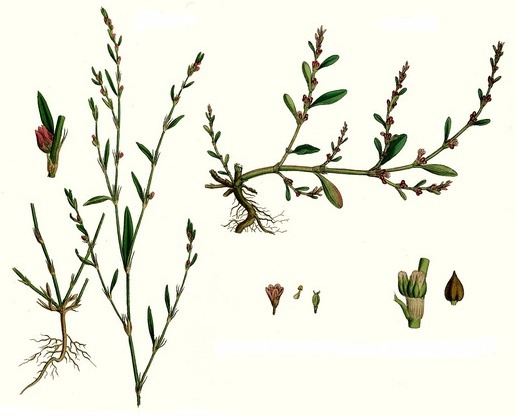Knot-grass – Knotweed – Polygonum aviculare L.
Annual herb up to 30-40 cm, families grechishnыh (Polygonaceae). It grows everywhere on arable land, roads, of otmelyah. For medical purposes harvest the grass knotweed.

Chemical composition Knotweed
Grass Knotweed contains a large amount of ascorbic acid, vitamin K and provitamin A (carotene), and flavonolovy glycoside avikulyarin, tannins and silicic acid compound.
Pharmacological properties Knotweed
Grass Knotweed different multilateral pharmacological properties, depending on the content of a plant of various biologically active compounds. Galenic, prepared from the plant, increase urine output, excreted in the urine excess sodium and chlorine ions, whereby increases in renal glomeruli filtration and reverse resorption decreases in renal tubules. Grass Knotweed prevents the formation of urinary stones, that is associated with the content of herbal medicines plants of soluble silica, which are fairly high concentrations in the urine removed. During the passage of the urinary tract, they act as a protective colloid, reduces the degree of crystallization of mineral salts, thereby preventing the formation of urinary stones.
Galenicals plants positively affect the function of the gastrointestinal tract due tannins, have antimicrobial, anti-inflammatory and astringent properties. In the experiment, after the internal administration of herbal medicines Knotweed herb not only reduces the inflammation of the mucous membranes of the stomach and intestines, but also inhibited bacterial flora, decreases resorption from the intestine, diapedetic stops bleeding.
Flavonoidы, silicon compounds and tannin plants reduce the permeability of the vessel walls, increase blood clotting.
Besides, plant increases the contractility of smooth muscle organs, mainly strengthening the uterine contractions. Preparations plants have negligible hypotensive properties, deepen breathing.
Application knotweed in medicine
Knotweed herbal medicines and fees, in which the plant is the main component, used for chronic urinary tract you-conducting, weakening of glomerular filtration function and appearance in the urine of a large amount of mineral salts, especially the salts of oxalic acid. Preparations as plant aids prescribed in the early stages of kidney stones, in the postoperative period after removal of urinary stones, when urate diathesis, some skin diseases (acne, boils, Some dermatitis).
Thanks tannins grass mountaineer effective for gastroenteritis, diarrhea of various etiologies, while increased permeability of the vessel walls and diapedetic minor bleeding from damaged vessels of the mucous membranes of the gastrointestinal tract. The plant is used in functional failure and liver diseases, associated with a delay in the body of toxic metabolic products, because the grass Knotweed has antitoxic properties.
Infusions and decoction Knotweed used in uterine bleeding on the ground uterine atony, intestinal and hemorrhoidal bleedings.
Formulations Knotweed, Dosing and Administration
Infusion of grass Knotweed (knotweed): 15 g (3 tablespoons) raw material is placed in an enamel bowl, Pour 200 ml (1 glass) hot boiled water, capped and heated in boiling water (in a water bath) 15 m, cooled at room temperature for 45 m, filter, the remaining raw materials squeeze. The volume of the resulting infusion was adjusted with boiled water to 200 ml. The prepared infusion stored in a cool place no more than 2 d.
Take 1 / 2-1 / 3 cup 2-3 times a day before meals.
